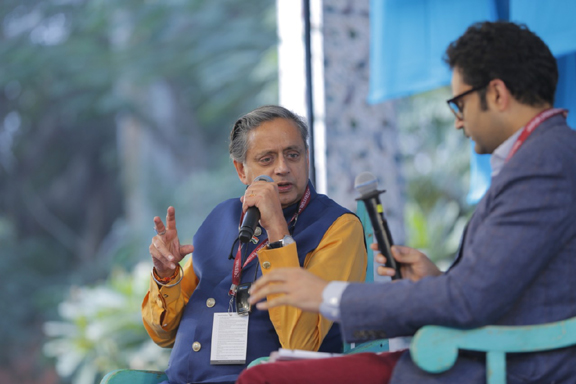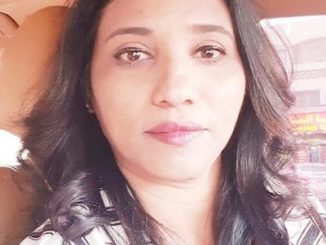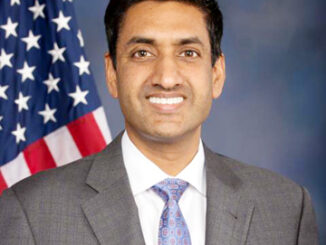By Dr Yash Goyal
Special Correspondent TIP
JAIPUR (TIP): Described as the ‘greatest literary show on earth’, the Jaipur Literature Festival is a sumptuous feast of ideas. The past decade has seen it transform into global literary phenomenon having hosted nearly 2000 speakers and welcoming over a million book lovers from across India and the globe.
Over the past 15 years, JLF’s core values remain unchanged, and the festival brings together a diverse mix of world’s top writers, thinkers, humanitarians, politicians, business leaders, sports people and entertainers on one stage to champion the freedom to express and engage in thoughtful debate and dialogue.
As the fear and threat of pandemic Covid-19 minimized this time, the 15th edition of iconic JLF was back at its customary city of Jaipur from January 19-23 with its characteristic flavour, substance and scale, bringing together writers, readers, connoisseurs, influencers and thinkers.
The magnificent and diverse programme for the much awaited 16th edition featured some of the most celebrated and extraordinary minds of the world. It displayed 21 Indian and 14 International languages with sessions spread across five venues.
The festival hosted 350 speakers from across a vast array of nationalities, as well as recipients of major awards such as the Nobel, the Booker, International Booker, the Pulitzer, the Sahitya Akademi, Baillie Gifford, Pen America Literary Awards, the DSC Prize for South Asian Literature and JCB Prize for literature.
In this season there was luckilyno political, social and religious controversy that could attract fanatic people to create hurdles and media hype.
Rajasthan Education Minister Dr B D Kalla conferred the 8th Kanhiyalal Sethia Award to K Satchidanandan for his best poetry. A cash Prize of Rs. One lakh and memento of appreciation along with a felicitation was gave away by Dr Kalla and its organizer.Siddharth Sethia of Mahakavi Kanhaiyalal Sethia Foundation, said, “MKSA Sethia Poetry award in association with JLF is a platform which brings the versatility of Indian poetry to a global audience.”
Recipient of Nobel Prize in Literature 2021, Abdulrazak Gurnah has inaugurated the JLF with his key note address ‘writing as a form of resistance’. In another session devoted to him, the Tanzanian-born British author of 10 novels Gurnah said, “I was young, untraveled, unskilled and poor 18-year-old boy in this country (UK) which does not want me. The need to understand that feeling of having lost, the hostility, adventure, all of these, I was trying to work all that out that started me off writing. But I was not writing, it was not writing, rather trying to work things out and reflecting, not intended for anybody to see. Sometimes, writing starts like that”.
Saying that he never thought of publishing when he started writing, Gurnah said, “When you start fictionalizing, you innovate, enhance, diminish, or whatever. But none of these were intended for writing. But then slowly, the ambition stirred, and I wanted to do something with these writings”.

Noted Politician-Author Shashi Tharoor had the maximum sessions for interaction on wide variety of subjects including politics, history, and current topics.Media always awaited Tharoor’s press briefing every year, and this time on the grand success of Bharat Jodo Yatra (BJY), he announced that he would write a book on this as this has very significantly rehabilitated the image and success of Rahul Gandhi who is walking on the roads from Kanyakumari to Srinagar. Saying that he is already writing a column on BJY in a Malayalam newspaper’s website, Tharoor said that it has been confirmed that Yatra has a huge success in the entire country.
“It has very significantly rehabilitated the image of Rahul Gandhi. After all, a caricature of Pappu business was erased. The older caricature was based on three charges: One, he is a politician who sits on small dharna, and participates in protests only. Now it is proven that he has been marching on roads not for a day, but for 150 days on 3570 kms. Now you cannot put this first charge anymore”, Tharoor said.
“Second charge: RaGa was arrogant, inaccessible, etc. What do you see now, he meets all sorts of people, from all walks of life, shakes their hands or holds them, and marches with them”, he elaborated.
“Third charge: RaGa is not serious and cannot talk on politics. Now, he has dozens of press conferences. How many PM Narendra Modi has till now?”, he asked, adding “He is totally transformed by his Yatra. The public has seen the outcome”.
“RaGa’s BJY has energised the party and its workers. Inspired everyone and given new energy”, Tharoor confidently said, adding, “If the party wants to win the next LS polls 2024, then the party workers, who feel motivated should go for an energetic campaign to have it”.

Renowned poet, lyricist, author and screenwriter Gulzar also addressed a few sessions. In an interaction Gulzar said poetry was not just a matter of textbooks but it is connected with everyday life and things.
“Today’s generation feels that poetry is a matter of textbooks. They are not able to see it by connecting it with everyday life and things. So I have added these 365 contemporary poems (Nazam) for them only in my book : A Poem A Day. Through them, they will also be able to understand the pulse of the changing times”, Gulzar told the audience. ‘A Poem a Day’ is a collection of 365 Nazms compiled by Gulzar Sahib. He has collected contemporary poems of 365 poets from 1947 to 2017 and translated them into Hindustani.He strongly said no language was small and that all languages with scripts can be considered as national languages.

In ‘Daira and Dhanak’ session two famous poets of their time, Jaan Nisar Akhtar and Kaifi Azmi, were mentioned. ‘Daira’ and ‘Dhanak’ are collections of poems by Jaan Nisar Akhtar and Kaifi Azmi respectively, edited by Javed Akhtar and Shabana Azmi. Through these two great poets who were born at the same time, some pleasant things of that period and nazms were shared with the audience. Akhtar saheb mentioned the progressive movement in 1930 and its impact on the writings of both the poets. There are many similarities between these two poets but mentioning a big difference, famous actress Shabana Azmi said, “The picture of women in both the poems is completely different. Such interesting discussions are nothing less than a ‘treat’ for the listeners”.Former NDTV anchor and senior journalist Ravish Kumar engaged in a riveting discussion about ‘fear’ and its role in politics today. He began by discussing the fears he has had as an individual, and then related these to the fear that has been instituted by the state. He spoke at length about political prisoners, the rich and judges—and how all of them are afraid of the government today. In that sense, the undergirding theme of the talk was the all-encompassing nature of fear.
Sudha Murty, an Indian educator, author and philanthropist said about how writing has changed her. Murty told everyone that her first book got published when she was 29 in Kannada. She further emphasised on the importance of her mother tongue and the culture of the land. She started writing in English at the age of 52.
“I connect to the people because I tell the truth. I don’t act. What you see, you only get that much. Nothing extra… What I say, I walk.” She said, “Normally, if you’re truthful when you write, then you can establish a relationship. That’s what I believe.”
Biologist and author Merlin Sheldrake talked about his book Entangled Life and shed light on the enchanting world of fungi and how they are intrinsic to our existence. The focus of Sheldrake’s book is on how fungi play a role in shaping our futures and making our worlds. Sheldrake also talked about how deeply linked the arts and the sciences are and that the passion for both emerges from a place of wonderment and curiosity.
Speaking at the session “The Elephant and the Dragon”, Former Indian Army Chief J J Singh said, “The situation of the Indian Army is not the same as it was in 1962. I want to reassure you that they got bloody noses in Galwan Valley, they were made to stop in Doklam and similarly, they were told to go back to Twang valley. This is the New India they are facing and they must understand India is no longer the same”. He anticipated that India and China can get into a constructive and positive engagement which is only through dialogue and discussions.
Professor of Mathematics at the University of Oxford, Marcu Du Sautoy stressed on how math lets us do more with less and attempts to solve the age-old question of hard work truly being the only key to success.
Renowned classical musician, Padma Bhushan Hariprasad Chaurasia and author Sathya Saran, in conversation with Managing Director and Festival Producer Sanjoy K Roy, discussed anecdotes from Chaurasia’s childhood and his journey with the bansuri. Namita Gokhale, JLF’s co-director, noted woman writer, and recipient of Sahitya Akademi award for his book “Things to Leave Behind” in 2021 also talked on “A Life in Books” and her latest book “JAIPURNAMA”.
Among others who figured &attracted audiences in many sessions included actor Deepti Naval, veteran TV journalist Vir Sanghvi, former Foreign Secretary Shyam Saran, Infosys co-founder Nandan Nilekani, and Deputy Executive Director United Nations Women, Anita Bhatia.





Be the first to comment